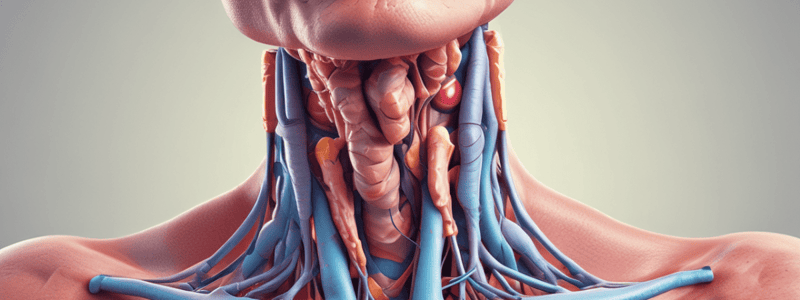Podcast
Questions and Answers
Which type of infection is thought to be a common trigger for De Quervain's thyroiditis?
Which type of infection is thought to be a common trigger for De Quervain's thyroiditis?
- Bacterial infection
- Viral infection (correct)
- Malaria infection
- Fungal infection
What transient thyroid disorder can occur in about 50% of patients with De Quervain's thyroiditis?
What transient thyroid disorder can occur in about 50% of patients with De Quervain's thyroiditis?
- Graves' disease
- Hashimoto's disease
- Hypothyroidism
- Thyrotoxicosis (correct)
Which viral infection is NOT specifically linked to De Quervain's thyroiditis?
Which viral infection is NOT specifically linked to De Quervain's thyroiditis?
- Adenovirus
- Mumps
- Influenza (correct)
- Rubella
What long-term complication may develop in some cases of De Quervain's thyroiditis?
What long-term complication may develop in some cases of De Quervain's thyroiditis?
What laboratory tests can support the diagnosis of De Quervain's thyroiditis?
What laboratory tests can support the diagnosis of De Quervain's thyroiditis?
Which initial thyroid function abnormality is typically seen in patients with De Quervain's thyroiditis?
Which initial thyroid function abnormality is typically seen in patients with De Quervain's thyroiditis?
What may patients need to consider for follow-up care after being diagnosed with De Quervain's thyroiditis?
What may patients need to consider for follow-up care after being diagnosed with De Quervain's thyroiditis?
Which of the following is a potential complication of subacute thyroiditis?
Which of the following is a potential complication of subacute thyroiditis?
Which laboratory test is typically elevated in patients with subacute thyroiditis?
Which laboratory test is typically elevated in patients with subacute thyroiditis?
What symptom is NOT commonly observed in patients with De Quervain's thyroiditis?
What symptom is NOT commonly observed in patients with De Quervain's thyroiditis?
Which treatment option may be used in extreme cases of subacute thyroiditis where pain is particularly debilitating?
Which treatment option may be used in extreme cases of subacute thyroiditis where pain is particularly debilitating?
Flashcards are hidden until you start studying
Study Notes
Understanding Subacute Thyroiditis (De Quervain's Thyroiditis): An Overview
Subacute thyroiditis, also known as De Quervain's thyroiditis, is a self-limiting inflammatory disorder of the thyroid gland that typically follows a viral infection. Characterized by systemic symptoms such as myalgia, malaise, and fatigue, this condition often presents with severe anterior neck pain and swelling of the thyroid gland. Let's explore the causes, symptoms, diagnosis, complications, and treatments related to this condition.
Causes
De Quervain's thyroiditis is thought to result from a viral infection, including those that directly target the thyroid gland or trigger an immune response leading to gland inflammation. Some specific viruses linked to this condition include mumps, measles, rubella, coxsackie, and adenovirus. Recently, evidence has also emerged suggesting that COVID-19 can trigger subacute thyroiditis.
Symptoms
The primary symptoms of De Quervain's thyroiditis include severe anterior neck pain over the thyroid gland and swelling. Patients may also experience fever, general malaise, myalgia, and arthralgia. Additionally, thyrotoxicosis—a transient form of hyperthyroidism due to increased thyroid hormone production during the inflammatory phase—can occur in approximately 50% of patients with this condition. In some cases, hypothyroidism may develop later as a long-term complication.
Diagnosis
Diagnosing De Quervain's thyroiditis is based on clinical presentation, supported by laboratory tests such as elevated serum concentrations of C-reactive protein, erythrocyte sedimentation rate, and leukocyte counts. Thyroid function testing will show initial signs of hyperthyroidism followed by hypothyroidism before returning to normal levels in most patients. Ultrasound imaging can reveal changes in the thyroid gland consistent with the disease process.
Complications
Although rare, complications associated with De Quervain's thyroiditis can include acute complications like sudden-onset thyrotoxicosis and severe thyrotoxicosis, which may lead to atrial arrhythmias or congestive heart failure. Long-term complications include permanent hypothyroidism requiring thyroid replacement therapy in less than 5-10% of patients. Disease recurrence has been reported in occasional cases (up to 20% of cases in some series). Other potential complications, although not documented frequently in case reports, include multiple system organ failure, pancreatitis or splenomegaly, vocal cord paralysis, and cerebral venous thrombosis.
Treatment
Treatment for De Quervain's thyroiditis typically involves nonsteroidal anti-inflammatory drugs (NSAIDs) and beta-blockers to manage symptoms during the initial hyperthyroid phase. In some cases, a short course of glucocorticoid therapy may be necessary. Patients should monitor their thyroid function and consider follow-up care with their primary care provider as soon as possible.
In conclusion, De Quervain's thyroiditis is a self-limiting inflammatory disorder of the thyroid gland with various symptoms and complications associated with its presentation. Understanding this condition's causes, diagnosis, and treatment options can help healthcare providers better manage their patients' care during the recovery process.
Studying That Suits You
Use AI to generate personalized quizzes and flashcards to suit your learning preferences.




